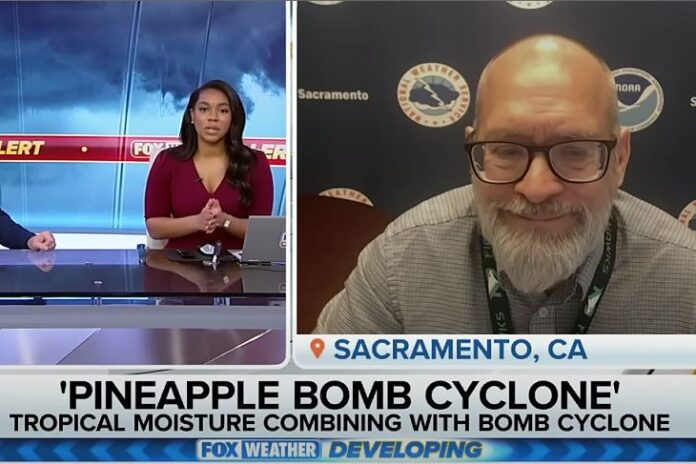It should be good news: large rainstorms have been dumping huge amounts of rain and snow on the drought-plagued Golden State, and much more is expected. After draconian water restrictions were placed on many residents last summer—with many forced to watch their lawns disintegrate into a crispy death—one would think all this water would be welcome.
But if you read a lot of the media out there, you’d think storms were a bad thing; we should get rain and snow—just on our terms, not the weather’s.
Here are some recent headlines regarding the impending “catastrophic consequences“:
- USA TODAY: ‘Truly a brutal storm’ heading for California; forecasters predict flooding, landslides, deaths: Live updates
- KRON4 San Francisco: Parade of storms not enough to end drought, California snow surveyors say
- CBS: Forecasters warn of ‘brutal,’ potentially deadly storm system arriving Wednesday
- FOX News: California faces double whammy of bomb cyclone, ‘Pineapple Express’ for ‘brutal’ storm threat
- NPR: A third atmospheric river storm is set to add to misery in California’s flooded areas
There are many more, but you get the idea. Buried behind the scary paragraphs about flooding, “bomb cyclones,” potential drownings, et al. is the fact that the precipitation has so far brought the all-important Sierra Nevada snowpack to nearly 200 percent of its usual level at this time of year. Shouldn’t that be the headline?
Most ledes and stories all had the same theme: yeah, yeah, it’s historic, it’s almost something good—but don’t be happy because we’re still in a drought, and we probably always will be. Plus, these storms are a serious inconvenience and will cause flooding, which is terrible because in a perfect society we would have rain without consequences.
The New York Times knows what’s to blame for possible floods, printing the headline: “How Climate Change is Shaping California’s Winter Storms.”
Parade of Storms Hit California With Rain, Flooding https://t.co/rMhiCpmDFF
— Climate News (@climatenews) January 3, 2023
Hysterically, their subheadline undermines their own headline: “So far, the downpours are largely in line with past storms, an official said.” The conclusion, then, would be that climate change caused downpours that were mostly similar to previous storms.
Ouch, my head just spun around.
I do not discount the difficulties and danger that some will inevitably encounter because of flooding, but they’re a natural phenomenon. We can’t treat each instance of a deluge like it’s the apocalypse and has never happened before, and that somehow we’re responsible for it. In fact, Los Angeles County’s largest recorded rainfall over a 24-hour period was recorded in 1943, according to the LA Almanac. A huge snowstorm in Buffalo, NY this winter was treated as an unprecedented, unthinkable event, yet the “White Hurricane” in 1913 was responsible for the loss of an estimated 300 lives.
The media in their endless moaning about the California drought often fails to mention that drier years may cause problems, but that the state’s lack of infrastructure is also a leading cause. The Los Angeles Times (surprisingly) reported in 2019:
“When you look at the Los Angeles River being between 50% and 70% full during a storm, you realize that more water is running down the river into the ocean than what Los Angeles would use in close to a year,” said Mark Gold, associate vice chancellor for environment and sustainability at UCLA. “What a waste of water supply.”
California's water infrastructure is woefully inadequate. After years of drought & a few storms we are releasing water to the ocean due to lack of storage. Californians need water. California deserves solutions. @MilkenInstitute https://t.co/OxU2Bm1ouohttps://t.co/HI6lpK756h
— Westlands Water (@Westlands_Water) January 3, 2023
Making matters worse, the California Coastal Commission unanimously rejected a desalination plant in March of this year, and the state’s water czar resigned last summer over his frustration with Governor Gavin Newsom’s apparent disinterest in finding solutions.
The drought in California is a serious matter, but it would be better if officials actually tried to mitigate its effects by conserving H2O instead of whining about every storm. Meanwhile, our depressives in the media will continue to make bad news out of even good information—but make no mistake about it, this onslaught of moisture is very, very good for the state.




